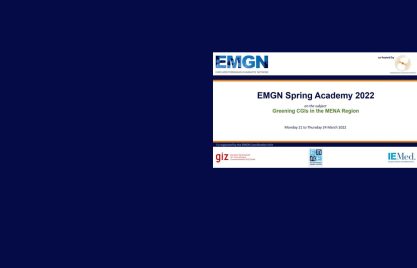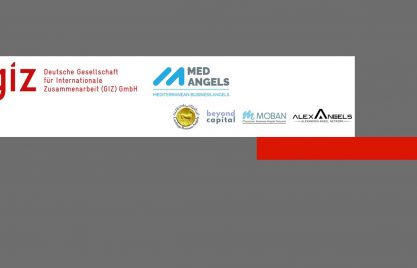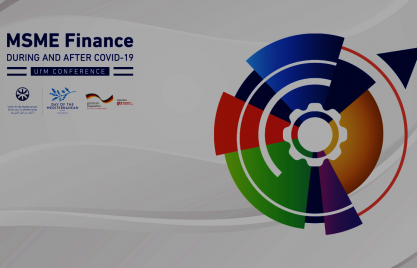On April 23, a panel of central bankers, investors and tech start-ups will investigate in which ways money is crucial in fostering business ideas and how inclusive financial sectors can contribute to the creation of new jobs and more equitable economic growth.
Government officials, development professionals, and players from the civil society, academia and private sector from across the Middle East and North Africa (MENA) are set to gather at the regional forum titled “Investing in the Arab future – Accelerating Sustainable Growth and Employment.”
The forum held by GIZ at the Dead Sea, Jordan, from April 22-24, 2018 aims to foster dialogue and learning about how to facilitate structural and private sector-led investments as well as labor and economic policies for achieving sustainable, inclusive growth and job creation in the private sector.
The panel titled “Finance for Jobs” will deepen participants’ understanding of the catalytic role of financial systems development at large, and financial inclusion in particular, for growth and employment. A Central Banker, venture capitalist, angel investor, and tech-startup founder that are engaged in financial inclusion policymaking in Jordan or in promoting start-ups in Egypt will share insights through their respective macro and micro-level interventions.
Money, in brief, allows individuals to manage their households and future plans, businesses to emerge, engage in the market and expand, and governments to assure societal wellbeing. Money keeps an economy running.

Financial sector development experts working in policy, development, investment or with service providers cater to enhance the financial and non-financial opportunities and prospects for each of these groups, the interactions between them, and the health of the entire system. Generally speaking, their common mission is to assure a stable, well-functioning financial system that protects consumer interests and empowers the population towards ensuring high-level, long-term development goals covering social, economic and increasingly environmental aspects.
As part of this, the inclusion of people and businesses into the formal financial sector concerns the access to and usage of adequate financial services by low-income segments or other disadvantaged groups that are traditionally unserved or underserved by financial institutions.
In the countries of the MENA region, where median ages are below 30 years (CIA estimates 2016) and young adults, despite being increasingly well-educated, face formal unemployment rates as high as around a third in some cases (ILO, Berlin Institute/IFA), financial exclusion is also true for them. Compared to the older population, on average, a smaller share among young adults have accounts (31.9% for 15-24 vs. 47.6% for 25+ year-olds), made or received digital payments in the last year (25.5% vs. 36.1%), and saved at a financial institution (8.9% vs. 11.5%; World Bank Global Findex data 2017).
The problem of financial bottlenecks constraining private sector development, thus growth and employment is real. Although they represent more than 80% of all registered businesses in the MENA region, only one in five small and medium-sized enterprises (SMEs) has a loan or line of credit at a financial institution. The funding gap for these businesses, often referred to as the ‘missing middle’, is estimated at a whopping USD 260-320 million (IFC). Their available funding options, particularly long-term finance, and hence growth prospects are very limited. This is the case in economies with historically dominating, yet saturated, at times shrinking, public sectors.
Money, be it in the form of savings, loans, or cash flow, for example, enables entrepreneurs – including young adults, women and refugees – to start businesses and startups to grow and provide new prospects for job-seekers. Access to very fundamental financial services, many times wrapped with advice, by banks, microfinance companies, payment service providers, leasing and factoring companies, as well as angel investors and venture capitalists provides the very first step to this end.
In 2015, the Central Bank of Jordan embarked on a policy process to enhance inclusive finance in the Kingdom together with public, private and civil society players. Jordan’s Financial Inclusion Strategy 2018-2020 is the first in the region, supported by GIZ. Innovative financial services and new technologies hold great promise to empower largely unbanked women, young people, refugees, startups, and SMEs to contribute to and benefit from sustainable and inclusive growth.
Entrepreneurs and start-ups are the main drivers of job creation in many economies, yet have limited access to finance. This in turn prevents jobs from being created and economies from growing. Angel investors typically invest at very high risk in the early stages of businesses. Promising entrepreneurs receive funding and mentoring for their businesses. GIZ Egypt recognizes this potential and promotes angel investment as the first project within GIZ.
Financial inclusion is increasingly leveraged as a means to stimulate inclusive growth, employment and socio-economic cohesion. These goals are aligned with the range of the United Nations’ 2030 Sustainable Development Goals (SDGs) which hold industrialized, emerging markets, and developing states, as well as the civil society and private sector accountable for a sustainable future.
By Atilla Kaiser-Yuecel



